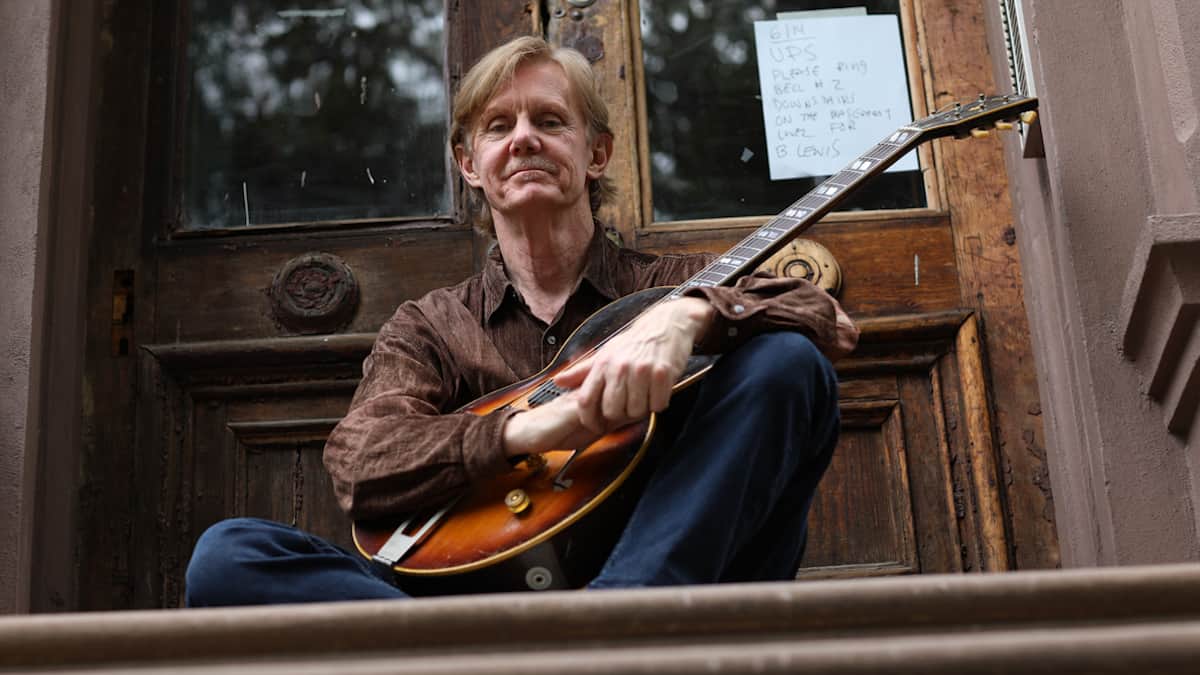Artist Features
Jazz Guitar Today Interview With Guitarist Tomas Janzon

Jazz Guitar Today contributor Joe Barth interviews guitarist Tomas Janzon – discusses his new CD, “Nomadic”
Born in Stockholm, Sweden, Tomas Janzon now makes his home in New York City. As a child, he played the recorder and cello and was proficient enough to perform with the Collegium Musicum in Stockholm at age twelve. Taking up the guitar he eventually moved to Los Angeles to study with the great Joe Diorio at Musicians Institute/GIT and later earned a Master’s Degree in Classical Guitar from USC. Tomas just released his new album Nomadic.

JB: You grew up in Stockholm, Sweden starting young on the recorder and then cello, but what drew you to play jazz guitar, and what was most helpful in your personal development as a guitarist?
TJ: My very first steps with jazz guitar was a combination of finding Django Reinhardt, transcribing his “Minor Swing” and then “Nuages,” and at the same time running into Charlie Parker and his “Cool Blues.” I was early thinking about improvising, walking home from school with a Bach prelude ringing after the cello lesson, and hearing all kinds of variations. It was fun and maybe a bit weird. I didn’t think about it as improvisation, but I guess that’s where it starts, in your head.
JB: You moved to Los Angeles to study with Joe Diorio. Tell us how working with Joe was most helpful to you.
TJ: That’s a great question. I wrote an article about it for Just Jazz Guitar magazine “Considering Tap Dancing”. It’s been an amazing experience when Joe moved back to Waterbury CN and I was soon in New York. I kept getting together with him now and then driving up from Harlem. He was like an infinite inspiration. Always writing new ideas, playing, and thinking about the music. I have so much material from him. But what I have with me today more than anything is the way he would always find new approaches, harmonization, and lines, always coming from inspiration. This creative approach of knowing that the music doesn’t end and that there is always more to musically explore. As he said, “One lifetime isn’t enough”.
JB: Then you went on to complete a Master’s degree in classical guitar from USC. How has studying classical guitar helped you as a jazz guitarist?
TJ: It was a fantastic experience. Jim Smith (and Scott Tennant) were great at finding related material. Of course, I played Bach which was already close to me, but I also played Ralph Towner’s “The Juggler’s Etude” which is kind of built like a long improvisation, using classical techniques with modern jazz harmony. I also found others, like Jorge Morel, and I am actually relearning his “Romance Criollo” for some gigs this summer. When I started deciphering the harmony in classical pieces, I found a lot of ideas that I use in my jazz recordings. A dominant chord is always a 7th-chord whatever style. It can be helpful if you want to expand from playing either chords or lines or instead mix it up and use more options. I’m also transferring things to playing with a pick for jazz most of the time.
JB: You have a number of wonderful CDs out. Tell us about your goals in making your new CD Nomadic.
TJ: The goal is to focus on purpose and to produce an album that makes me collect myself and move forward. The purpose is to reach out and by that hopefully, be able to bring some goodness to this place.
JB: Tell us about the guitar and amp that you use.
TJ: I have been playing my Gibson L7 (1959) almost all the time. It is a lovely instrument, it does take some work to play but it’s rewarding. I only use big single coil pick-ups, like P90s. Another great guitar is my Epiphone Casino (1963), but it is in Los Angeles right now waiting for the new P90s by Lin Fralin.
I use almost exclusively tube amps, Fender DeVille 212, DeVille 112, I also have a Music Man 210 that is nice with smaller speakers.
JB: As a gigging musician, how does the scene in Europe compare with that in the United States? What advice would you give young American musicians who want to break into Europe?
TJ: It is hard to compare. The different countries in Europe all have their own traditions in terms of supporting jazz. Maybe one can say that there are a few more subsidized possibilities in Europe but it’s all very competitive. And now they are booking more European acts, when before there was more focus on jazz from the US. If there is any advice, maybe it is good to focus on one country, where you have some kind of connection. Then just start googling, calling, and emailing. It’s a workout. But it’s possible. Every club is getting lots of offers. One just has to keep calling and emailing, releasing music, getting reviews, and all that. Also, keep an eye on possible teaching and clinic situations along the way.
Subscribe to Jazz Guitar Today – it’s FREE!
-
Jazz Guitar Lessons2 weeks ago
New JGT Guitar Lesson: Analyzing “Without A Song”
-
Jazz Guitar Lessons4 weeks ago
New JGT Guitar Lesson: Considering “Falling Grace”
-
Artist Features1 week ago
New Kurt Rosenwinkel JGT Video Podcast – July 2024
-
Artist Features3 weeks ago
JGT Talks To Seattle’s Michael Eskenazi



















